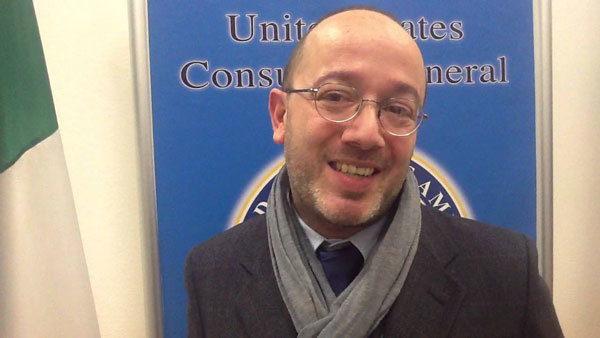Security partnership with Russia is important for Europe: Italian expert

Commenting on recent French president’s remarks, Dr. Pastori Gianluca says by emphasizing the need to engage Moscow in a ‘security partnership’, Macron touches an important point.
Washington’s move to distance itself from the NATO military alliance and its withdrawal from international agreements has thrown light on the urgent need for Europe to take its defense and security into its own hands.
Couple of days ago the French president, Emmanuel Macron, has warned that Europe can no longer depend on the U.S. for its military defense and called for an urgent new European security policy.
“Europe can no longer rely on the United States for its security,” Macron said in a foreign policy speech at what he called a “crisis moment” for European politics and global multilateralism. “It is up to us to guarantee European security.”
Macron vowed to put forward new proposals in the coming months for the EU to boost defense cooperation, as well as talks with Russia on their security relationship, an issue of concern for countries on Europe’s eastern edge.
To shed more light on the issue we reached out to political science associated professor of Milan Catholic University of the Sacred Heart, Dr. Pastori Gianluca.
Following is the full text of our interview with him:
Q: How do you assess recent remarks of the French President about the necessity of EU security independence from the U.S.?
A: Having a common foreign and security policy is a traditional European ambitions and the EU has gone a certain way on this path. The main problem is its limited military capabilities. Since the beginning of Trump’s presidency, the European countries have intensified their efforts in this sense, with France and Germany assuming a leading role. President Macron’s remarks fit into this framework, and aims at confirming the French leading role in the process.
Q: After Trump took office in the U.S., he intensified pressure on Europeans to burden more share of NATO costs. Since then the Europeans have made efforts to form European Army. It seems after the recent remarks of the President Macron the formation of the European Army will become more serious. What do you think of this?
A: Building a ‘European Army’ is a long and difficult process and Macorn’s remarks can hardly affect this state of things. European countries have different visions of the problem. Some of them are not interested in increasing their defence expenditure; some others cannot do that, due to financial problems. Several NATO members think that remaining under the U.S. umbrella is still the best option. Finally, military and defence issue are a very sensitive topic for the ones who think that the EU has already reduced too much the sovereignty of its member states.
Q: Is Europe basically able to be militarily independent from the U.S.? If yes, what will be the fate of NATO?
A: I do not think that a ‘military Europe’ could really do without NATO. Currently, only the U.S. -- either directly or through NATO -- can provide the high value assets that modern warfare needs. However, a stronger European military identity could be useful in establishing a more even relation between Europe and the U.S. However, condition sine qua non is that Europe could ‘speak with a single voice’, i.e. that it could have a real common position on the different issues at stake.
Q: Some analysts have interpreted Macron’s remarks as New Western Order. Will the West enter a new era with a new order independent from the U.S.?
A: It is several years that the international system is changing and that the U.S. is no more the ‘lonely superpower’. However, imaging an international system not including them as one of its main components would be naïve. Can the EU be a part of this multipolar system? I think so. From many points of view, the EU is already a global player. Once again, to strengthen its role, the EU must learn speaking with a single voice, and this is a problem when its same members challenge its credibility.
Q: President Macron has emphasized on the necessity of Europe security partnership with Russia. How do you assess this?
A: Russia is an important player in the current international system, as well as in important element of the European puzzle. Both international and European stability cannot do without Russia. By emphasizing the need to engage Moscow in a ‘security partnership’, Macron touches an important point. The main problem is having strong foundations to build this partnership on, and now these foundations still lack, largely because Moscow and Brussels do not share a common vision of the working of the international system.
